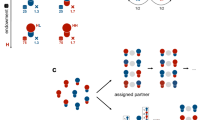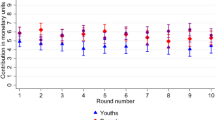Abstract
We study household formation in a model where collective consumption decisions of a household depend on the strategic choices of its members. The surplus of households is determined by individual choices of levels of friendliness to each other. A strategic conflict arises from a coupling condition that ceteris paribus, a person’s friendlier attitude reduces the individual’s influence in the household’s collective decision on how to divide the ensuing surplus. While partners in an isolated household choose the minimum level of friendliness, competition for partners tends to promote friendliness. We find that affluence does not buy affection, but can lead to withholding of affection by an affluent partner who can afford to do so. In general, the equilibrium degree of friendliness proves sensitive to the socio-economic composition of the population.
Similar content being viewed by others
References
Basu K.: Child labor: cause, consequence, and cure, wit remarks on international labor standards. J Econ Lit 37, 1083–1119 (1999)
Basu K.: Gender and say: a model of household behavior with endogenously determined balance of power. Econ J 116, 558–580 (2006)
Becker G.S.: A theory of marriage, Chap 11. In: Becker, G.S. (eds) The Economic Approach to Human Behavior, Paperback edition, pp. 205–250. The University of Chicago Press, Chicago (1978)
Becker G.S.: A treatise on the family, enlarged edition, First Harvard University Press paperback edition. Harvard University Press, Cambridge (1993)
Browning M., Chiappori P.-A.: Efficient intra-household allocations: a general characterization and empirical tests. Econometrica 66, 1241–1278 (1998)
Browning M., Bourgignon F., Chiappori P.-A., Lechene V.: Incomes and outcomes: a structural model of intra-household allocation. J Polit Econ 102, 1067–1096 (1994)
Che Y.-K., Gale I.: Caps on political lobbying. Am Econ Rev 88(3), 643–51 (1998)
Che Y.-K., Gale I.: Difference-form contests and the robustness of all-pay auctions. Games Econ Behav 30, 22–43 (2000)
Chiappori P.-A.: Rational household labor supply. Econometrica 56, 63–89 (1988)
Chiappori P.-A.: Collective labor supply and welfare. J Polit Econ 100, 437–467 (1992)
De Dreu C.K.W., Van Lange P.A.M.: The impact of social value orientations on negotiator cognition and behavior. PSPB 21(11), 1178–1188 (1995)
De Dreu C.K.W., Weingart L.R., Kwon S.: Influence of social motives on integrative negotiation: a meta-analytic review and test of two theories. J Pers Soc Psychol 78, 889–905 (2000)
Gersbach H., Haller H.: Allocation among multi-member households: issues, cores and equilibria. In: Alkan, A., Aliprantis, C.D., Yannelis, N.C. (eds) Current trends in economics: theory and applications, Springer, Berlin (1999)
Gersbach, H., Haller, H.: Outside options, household stability, and equilibrium efficiency. Working Paper (2000)
Gersbach H., Haller H.: Collective decisions and competitive markets. Rev Econ Stud 68, 347–368 (2001)
Gersbach, H., Haller, H.: The affectionate society: does competition for partners promote friendliness? CEPR discussion paper no. 5030 (2005)
Haller H.: Household decisions and equilibrium efficiency. Int Econ Rev 41, 835–847 (2000)
Lewicki R.J., Litterer J.A., Minton J.W., Saunders D.M.: Negotiation, 2nd edn. Irwin, Boston (1994)
Lundberg S., Pollak R.A.: Non-cooperative bargaining models of marriage. Am Econ Rev Pap Proc 84, 132–137 (1994)
Manser M., Brown M.: Marriage and household decision-making: a bargaining analysis. Int Econ Rev 21, 31–44 (1980)
McElroy M.B., Horney M.J.: Nash-bargained household decisions: toward a generalization of the theory of demand. Int Econ Rev 22, 333–350 (1981)
Mikula G., Wenzel M.: Justice and social conflict. Int J Psychol 35(2), 126–135 (2000)
O’Connor K.M., Carnevale P.J.: A nasty but effective negotiation strategy: misrepresentation of a common-value issue. Pers Soc Psychol Bull 23, 504–515 (1997)
Stevenson B., Wolfers J.: Bargaining in the shadow of the law: divorce laws and family distress. Q J Econ 121(1), 267–288 (2006)
Author information
Authors and Affiliations
Corresponding author
Additional information
We would like to thank Clive Bell, Edward Glaeser, Roger Lagunoff, Eva Terberger and seminar audiences in Berlin, Birmingham, Blacksburg, Exeter, Heidelberg, Manchester and at IHS in Vienna for helpful comments. We greatly appreciate the thoughtful comments of a referee.
Rights and permissions
About this article
Cite this article
Gersbach, H., Haller, H. The affectionate society: does competition for partners promote friendliness?. Econ Theory 40, 389–403 (2009). https://doi.org/10.1007/s00199-008-0381-5
Received:
Accepted:
Published:
Issue Date:
DOI: https://doi.org/10.1007/s00199-008-0381-5




